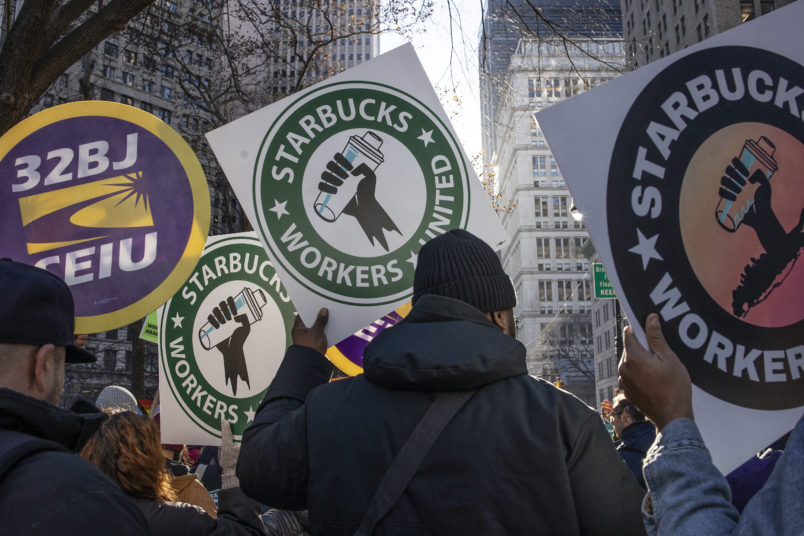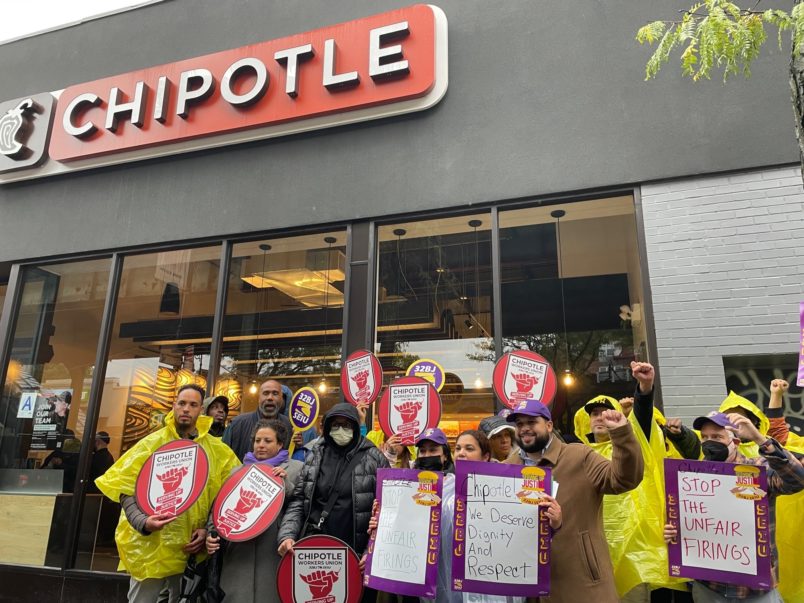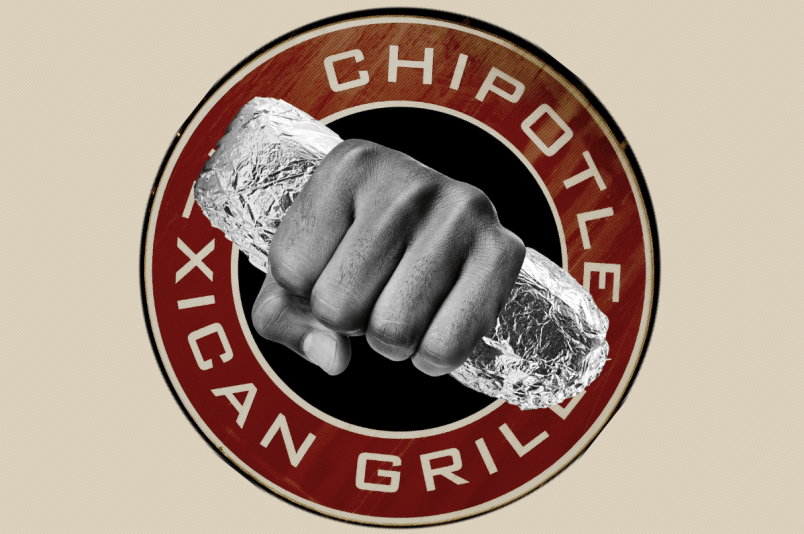In December 2021, Winifer Pena Ruiz got a new job at a Chipotle in the Bronx. She was an aspiring student, and she hoped the work slinging burritos would help finance her future education.
But within months on the job, she felt disrespected by the manager, and became frustrated by what she described as erratic schedules, low wages and poor benefits.
By April, Ruiz decided it was time to take action: She reached out to the Service Employees International Union, and began exploring the idea of unionizing her restaurant.
“I pursued the union because the manager I worked with would cut worker hours without their consent and also schedule people on days they requested off,” Ruiz told TPM via a translator.
For months Ruiz had a friendly relationship with her supervisor. She was even in talks for a promotion, she said. But when she became a vocal supporter of the union, she began to feel a shift in their relationship.
Then, in September, Ruiz was fired. In a corrective action form obtained by TPM, a manager wrote Ruiz was terminated because she “took the chicken out of the grill without taking the temperature of it.” Ruiz’s “corrective action,” the form said, was “termination.” Ruiz believes she was targeted specifically for her union activities under the guise of a legitimate complaint. “Since I’ve worked at Chipotle, I’ve never seen my coworkers take the temperature of the chicken,” another worker at Ruiz’s restaurant told TPM.
Two days after she was fired, the SEIU Local 32BJ filed an unfair labor practices complaint with the National Labor Relations Board on Ruiz’s behalf.
As Local 32BJ and other unions have pushed to organize the burrito chain, a string of similar disputes have arisen, many in the New York metro area. Ruiz was dismissed only a few weeks after 16 Chipotle workers filed complaints with the New York City Department of Consumer and Worker Protection, claiming they had their hours reduced in a way that violated New York City’s Fair Workweek Law. In April 2022, a worker at a Chipotle in Queens, New York filed a complaint with the NLRB, alleging she too had been fired in retaliation for efforts to organize a union.
In some cases, city, state and federal regulators have taken action. In 2020, Massachusetts fined the chain $1.4 million for violating child labor laws. In August, the chain settled a $20 million lawsuit with New York City to resolve violations of the city’s Fair Workweek Law, which requires restaurants to provide workers with their schedules two weeks in advance and offer 56 hours paid leave each year. (“I saw my general manager rip up a flier with information about the Chipotle settlement for $20 million,” Ruiz told TPM.)
Ruiz, who immigrated from the Dominican Republic in 2018 and supports family in the country with her work in restaurants, now works at a Chick-Fil-A.
Chipotle did not reply to repeated requests for comment. Ruiz’s former manager also did not respond to multiple requests for comment.
Ruiz’s case is one of 11 cases currently involving Chipotle currently open with the NLRB. Another case, also in New York City, was filed as recently as last month. So far, only one Chipotle branch has successfully unionized: workers at a restaurant in Lansing, Michigan voted to organize in August 2022. In July, Chipotle shuttered another restaurant in Augusta, Maine hours before the NLRB was due to speak with managers and employees about the logistics of a potential union election. In November, the NLRB ordered Chipotle to reopen that location.
“I think that the tactic that is being utilized by the anti-union campaigns of these various corporate-owned retail entities is to resist the unionizing effort as much as they can through a terror campaign, dismissals and unfair labor practices,” said Mark Pearce, who served as chairman of the NLRB during the Obama administration and is now the executive director of the Workers Rights Institute at Georgetown University Law Center.
“When they are unsuccessful in stopping the union drive from succeeding, then they resort to closing stores and locations in an effort to kill the enthusiasm for uniting,” he added.
Taking A Cue From Starbucks
The push to unionize Chipotle branches — and the claims of management-orchestrated union busting — have inevitably drawn comparisons to another unionization success story that has defined the current, resurgent labor movement: Starbucks.
The Starbucks union push has been fairly unique. Unlike many other union movements right now — like Amazon, for example — the Starbucks effort is on a store-by-store basis. Like Chipotle, some of these Starbucks locations may have only a dozen or so employees, compared to Amazon warehouses that employ thousands. The unionization push at the coffee chain saw its first success in Buffalo, New York in 2021, and now encompasses hundreds of Starbucks locations nationwide.
Starbucks’ union busting efforts are also fairly unique. Howard Schultz, who served as the CEO of Starbucks from 2008 to 2016, built a reputation during that time for successful union busting. Amid rumblings of the renewed union efforts, Schultz returned to Starbucks as an interim CEO earlier this year.
As the coffee chain tried to quash union efforts, it flew in managers from all over the country to branches that were in danger of voting in a union. At one point, organizers said, senior-level executives showed up in Buffalo to perform basic tasks, like mopping the floor. Organizers at Chipotle restaurants say the chain has taken that play from Schultz’s book, attempting to flood union-curious restaurants with more senior employees.
The first location to successfully unionize in Lansing, Michigan is a prime example.

“When we filed, the company brought a whole bunch of people from everywhere and told them they were managers-in-training — which they weren’t,” Scott Quenneville, President of Teamsters Local 243, who helped the Lansing store unionize, told TPM.
In speaking with these managers-in-training, workers discovered that they were actually managers from other stores elsewhere in the Midwest, Quenneville said.
“There were basically two managers for every crew member,” said Atulya Dora-Laskey, a worker at the Lansing restaurant. Dora-Laskey said the managers told him they had no idea why they were brought there.
Workers at the Lansing restaurant began exploring a union in 2021, hoping to have more of a say in scheduling and to push for higher pay and better benefits. When employees came to their supervisors with complaints, they often did not have the authority to respond, Dora-Laskey told TPM.
“The manager would often have their hands tied, and we realized that when Chipotle touts a focus on individual relationships, it’s more so they can take advantage of us — because when we are by ourselves, it’s much easier for them to retaliate or fire us, which did happen in one case when a co-worker asked for a raise,” Dora-Laskey said.
“We realized that because of that, we needed to be a collective solution because we had more power when we were all united as co-workers,” he added.
The efforts, by all indications, spooked the company. In addition to flooding the restaurant with managers from other locations, it brought in an independent consultant to meet one-on-one with workers. The consultant used common union-busting techniques, including claiming that unions profit off of workers and that, if workers unionized, they would no longer have a say in their workplace, Dora-Laskey said. The consultant, he said, would give special attention to workers who were not native English speakers.
Dora-Laskey alleges that the consultant would pull his colleagues aside and use the standard anti-union talking points like claiming they will need to pay union dues for life.
Starbucks employed similar tactics, and even allegedly tried to block workers who were knowledgeable and vocal about the union from attending meetings that management held with their colleagues to push anti-union propaganda. In one instance in Buffalo, the managers blocked an organizer, Michelle Eisen, from attending a meeting which the coffee chain referred to as a listening session.
“We’re not allowed to attend one of these captive audience meetings because it was apparent who the very outspoken union leaders were, and so they tried to separate us from our co-workers,” Eisen told me at the time. (She also told me she was watched while she sat in the parking lot, waiting for her colleagues to finish the meeting.)
NLRB Shifts Its Gaze To Chipotle
Starbucks has increasingly been under scrutiny from the NLRB. On November 15, the NLRB filed a nationwide cease and desist order against the coffee shop chain, ordering it to stop firing workers for their involvement in union activities. According to filings with the NLRB, in Buffalo alone Starbucks allegedly violated federal labor laws more than 200 times. Just last week, the NLRB found that Starbucks violated the law by refusing to bargain with employees at 21 stores in Washington state and Oregon.
The November order to Chipotle, demanding it reopen the Maine location it shuttered, suggests the agency is also keeping tabs on the burrito chain’s activities.
“What employers are doing is relying on a Supreme Court case in the ‘60s which states, in effect, that an employer in response to a union effort can legally go out of business rather than be forced to continue operations in a unionized facility,” said Pearce, the former NLRB chair, referring to Textile Workers Union v. Darlington Mfg. Co.
“There’s a caveat, however,” Pearce continued. “An employer cannot partially close the business in response to union activity. An employer cannot become a runaway shop — in other words, discontinue one location and enhance in another location in an effort to quell union activity. I believe that that’s what happened in Augusta.”
In that case, Chipotle claimed staffing issues were the reason the branch would close — not the union — and, in an email to workers, Chipotle HR said it would help the displaced workers get a new job at another location.

That didn’t happen. In addition to requiring it to reopen the restaurant, the NLRB stated in its November order that Chipotle had blacklisted one of the organizers of the union drive in Augusta from being hired at other Chipotle branches.
“My understanding is that Chipotle had identified those employees at the closed facility through their emails and blocked those emails from being processed for the new facility, and that all came to light because one of those employees used an alternative email to apply and was able to get through,” said Pearce.
Pearce argues that this whole ordeal was intended to send a message to low-wage workers, many of whom live paycheck to paycheck that if they try to unionize they’ll lose that little safety net they do have.
That didn’t exactly work for Chipotle. Locations across the country are trying to unionize now following Lansing’s successful move. Dora-Laskey and Quenneville say that several other locations around the country have reached out to them for advice in upcoming unionization efforts.
Experts like Benjamin Sachs, Kestnbaum Professor of Labor and Industry at Harvard Law School say that policies in Washington have made it very difficult for workers to organize; at the moment, workers are defying those fierce headwinds.
“An employer’s ability to withstand remedies is so strong that it just becomes this heroic, Herculean effort for workers to form a union. I do see Chipotle as consistent with the things we’re seeing in Apple, Amazon and Starbucks with some variation, but this is what unionization efforts look like in the United States,” Sachs told TPM. “It takes heroic efforts by workers to overcome intense managerial opposition and labor law that doesn’t protect workers’ rights to form a union.”
Correction: Due to an editing error, the article incorrectly listed the reason 16 Chipotle workers filed complaints with the New York City Department of Consumer and Worker Protection. Those complaints were due to reductions in hours that allegedly violated New York City’s Fair Workweek Law.







Fist! Good to see that workers are seeing effectiveness of a union.
Unions are the only way for the employees to protect themselves from management (speaking as one who was both a manager and later a union steward). The management principle is that all workers can be replaced if they “get out of line” and after all in their opinion the only people who deserve to be paid are managers and shareholders.
You’d think it’s because they view the people as just objects to be used and abused, but it’s worse. You’re not even an object, a “thing”…you’re less than one. Can they skimp on the kitchen buildout? Nope. Can they buy install shitty equipment such that they’re constantly replacing it? Nope. Can they just pay whatever rent they please? Nope. Can they skimp on the health and fire codes? Nope. Can they serve you wilted, rotting shit as a food product? Nope…no matter how hard Subway tries. Can they fail to post marginal growth, not just profit, to keep the shareholders happy? Nope. Can they just skip buying cleaning supplies? Nope. So what’s left? Functional slavery for the personnel and a political system that translates the employer-employee wealth disparity into the power to protect and maintain that system while reducing the “functional” caveat as much as possible.
Welcome back to the Gilded Age, my friends. We have some who build private rocket ships and others go to be hungry at night. What a country! Also too, let’s bring back some good union busting. Can’t let the serfs get too comfortable.
Stopped eating there the first time they spread Novo Virus. No reason to go back. Try Moe’s, they are better.